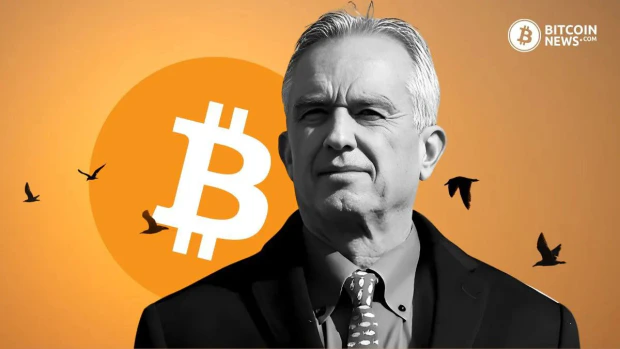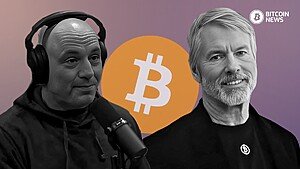The debate over Bitcoin’s role in financial freedom has been reignited by the vocal advocacy of Robert F Kennedy Jr., a US presidential candidate. Kennedy’s staunch support for Bitcoin stems from his belief in its potential to empower individuals and safeguard financial sovereignty amidst growing concerns over centralized control.
Bitcoin: A Beacon of Financial Liberation
Kennedy’s journey into the realm of Bitcoin began with a simple decision to invest in the digital asset for his children. However, this initial step evolved into a deep conviction in Bitcoin’s transformative power. He views Bitcoin not merely as a speculative asset but as a symbol of financial liberation in a world dominated by centralized institutions.
When questioned about whether he still possesses Bitcoin on the CNBC, he replied:
“Yeah, I’m still holding. My kids are very, very happy about it.”
Transactional Freedom and Decentralization
Kennedy emphasizes the importance of transactional freedom, likening it to the fundamental right of freedom of speech. He asserts that Bitcoin offers a pathway to financial autonomy, free from government intervention and censorship. By advocating for Bitcoin’s accessibility to the middle class, Kennedy aims to democratize access to financial services and protect individuals against inflation. He stated:
“The American middle class is getting rolled and the offramp from that, from the money printing machine, is bitcoin because it is hard currency, and we need to make [Bitcoin] transactionally available to the middle class.”
He cited the example of Canada, adding:
“We need to make sure that people wanting to protect themselves against inflation can have this, but also that they have transactional freedom and the government is not able to digitalize our currency like they did in Canada […] We’re not going to get that, you know, as long as the government controls our digitalized currency.”
In January, Canada’s Federal Court deemed Trudeau’s freezing of assets during the 2022 Freedom Convoy protests unconstitutional. Kennedy highlighted this event, saying:
“When the truckers disobeyed, you know, when the truckers protested peacefully, their bank accounts were shut down, and they couldn’t pay their mortgages, they couldn’t pay for their children’s education.”
Robert F Kennedy Jr on Challenges and Regulatory Hurdles
Despite Bitcoin’s promise, it faces regulatory challenges and skepticism from government officials. Kennedy remains critical of attempts to ban Bitcoin, attributing such calls to influence from big banks and financial institutions. He argues that these entities profit from inflation and fear Bitcoin’s disruptive potential to their monopoly over the financial system.
Kennedy underlines the recent efforts aimed at taking bitcoin down, stating:
“They want to ban (Bitcoin) because they are paid by Blackrock and JP Morgan and all the big banks, globalist banking monopolies, that are making money on inflation and making money by the Fed printing money.”
RFK Jr. also opposes Central Bank Digital Currencies (CBDCs). He and Trump vowed to prevent the Fed from issuing a digital dollar if elected. Kennedy warns against CBDCs, stating that they are “the ultimate mechanisms for social surveillance and control.”
Kennedy previously cautioned that the introduction of a CBDC could jeopardize financial privacy, as it enables government surveillance of all transactions. The Central Bank’s authority could impose restrictions on transaction amounts, limiting the destinations and timeframes for spending money.
Donald Trump, on a similar note, stated during one of his campaign speeches:
“As your president, I will never allow the creation of a central bank digital currency […] Such a currency would give a federal government, our federal government, the absolute control over your money […] They could take your money. You wouldn’t even know it was gone. This would be a dangerous threat to freedom.”
Bitcoin’s Role in Economic Empowerment
Kennedy sees Bitcoin as a catalyst for economic empowerment, particularly for marginalized communities lacking access to traditional banking services. Bitcoin’s decentralized nature offers a lifeline to these individuals, providing a secure and accessible means of storing and transferring value without intermediaries.
Kennedy’s vision aligns with efforts to promote financial inclusion on a global scale. He believes that by embracing Bitcoin, individuals can assert greater control over their financial destinies and participate fully in the global economy.
Shaping a Future of Financial Freedom
Robert F. Kennedy Jr.’s advocacy for Bitcoin underscores its growing significance as a tool for achieving financial freedom and autonomy. His unwavering support for Bitcoin reflects a broader movement towards decentralized finance and the preservation of individual freedoms in an increasingly digitized world.
Kennedy’s message resonates with those who believe in the transformative power of Bitcoin in challenging centralized control and fostering economic empowerment. As Bitcoin continues to redefine the boundaries of traditional finance, Kennedy’s voice serves as a beacon of hope for those seeking to reclaim control over their financial futures.
Kennedy vows to safeguard Bitcoin, ensure individual wallet ownership, end the White House’s anti-Bitcoin stance, and secure and endorse transactions. Bitcoin stands not just as a digital currency but as a symbol of financial sovereignty and individual empowerment, championed by figures like Robert F. Kennedy Jr.










